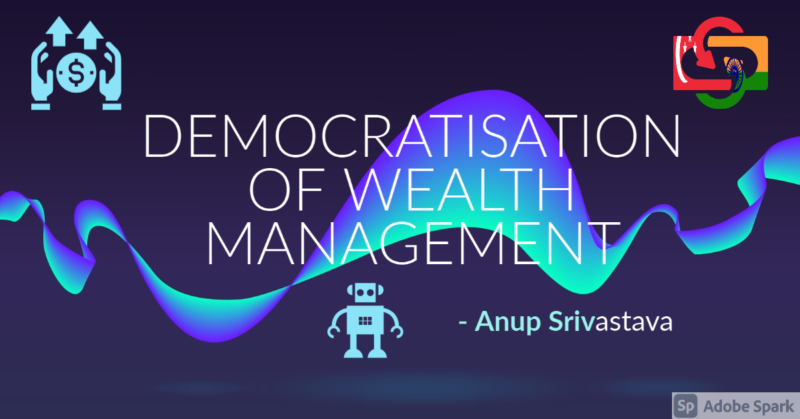The democratisation of wealth management has been well underway for the past few years. With the global economic downturn and the proliferation of digital solutions, has the wealth management finally reached the inflection point to take the democratisation of Wealth Management to the next level?
For years, investments into markets and complex products used to be the
playground of High Net Worth Individuals (HNWIs). This has changed in the last decade with more and more people becoming financially educated and taking a leap of faith in the investment universe. The investment vehicle of the general population has been property investments and to some extent into funds. Compared to a few decades ago, the buying power of the public has been increasing steadily.
The banking world is increasingly catering to the mass affluent segment to generate new revenue streams.
ENTER THE ROBO-ADVISORS
Robo-advisors are digital wealth management platforms providing automated advice and allowing standalone robo-advisors or banks to scale to reach a larger number of clients. Most robo-advisors ask you about your risk appetite and investment goals and propose an investment plan reflecting your goals and investment preferences.
The rise of robo-advisors in the last 3-4 years in Asia especially has brought more investment opportunities to the retail and mass affluent segments.
It is commendable what robo-advisors have been able to do for the wider population with risk-based portfolio constructions and minimal amount investments.
While robo-advisors have been a blessing, they do not let you pick individual securities, funds or ETFs the investors may want to invest in. The portfolio construction and stock picking are done by the Portfolio Managers at robo-advisor firms.
THE CURRENT STATE OF WORLD MARKETS
Due to the Covid-19 lockdowns, there have been quite a lot of businesses that have had to close or drastically scale down their operations. Singapore’s economy entered a technical recession after shrinking by 41.2% in the second quarter compared to the previous quarter, advance estimates by the Ministry of Trade and Industry showed in July. The economic figures from other countries are still awaited. Despite the
downturn in the world economy, stock markets have been gaining steadily during the last few months. Whilst nobody can predict stock markets, all investors are keeping a watchful eye if markets will crash.
On the opposite spectrum, there is a huge spurt of new users entering the market.
The trading app Robinhood reportedly has 3 million new account registrations just this year till May. Its users buy and sell the riskiest financial products like Options and do so more frequently than customers at other retail brokerage firms, but their inexperience can lead to staggering losses. Amateur investors have been piling in
money into different stocks and taking advantage of the market crash earlier in March, but the billionaire investor Leon Cooperman has rebuked these gains and believes they will “end in tears”. Robinhood has been able to gamify trading and with a sales pitch of no trading fees or account minimums, it has attracted young people in droves. Robinhood’s average customer is young and lacks investing know-how.
The average age is 31, the company said, and half of its customers had never invested before. This is where sound financial guidance from the experts will help bring true Democratisation of wealth management with the correct advice.
It remains to be seen how markets play out over the course of this year.
WHAT IS NEXT FOR DEMOCRATISING WEALTH MANAGEMENT FURTHER WITH ADVICE?
The next steps lie somewhere between robo-advisors and trading apps like
Robinhood.
The intelligent investor of today looks at constructing their own portfolio but also needs advice and confirmation of their financial analysis.
The rising number of use cases and applications of Artificial Intelligence (AI) and Machine Learning (ML) along with integrated conversations and chats like Whatsapp, Line, Wechat, etc. within wealth applications will go a long way towards providing good advice to investors.
The tech-savvy investor expects all information on-the-go on their mobile or Tablet. AI/ML integrated wealth apps can help clients give insights
into different investment strategies and products and help them in constructing their portfolio. Also, a social network integrated app can help Relationship Managers advise and serve a large number of customers. The advancements in technology have made this all possible today compared even to the last decade.
CONCLUSION
The democratisation of wealth management is expanding at a pace, but we are yet to see the end of it. The technology upliftment has enabled firms to scale while being cost efficient.
The wealth management industry has been undergoing widespread
changes with the younger generation expecting apps and advice available on-the-go to be a standard rather than a value add. The impact of the technological advancements will be tremendous and will truly democratise wealth management.
